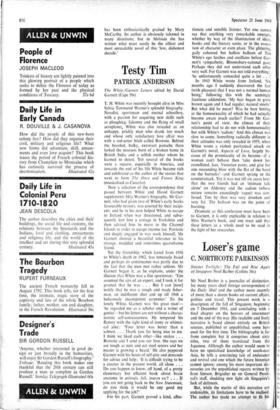Testy Tim
PATRICK ANDERSON
The White' Garnett Letters edited by David Garnett (Cape 50s)
T. H. White was recently brought alive in Miss Sylvia Townsend Warner's splendid biography. Novelist, sportsman and eternal schoolboy, with a passion for acquiring new skills such as ploughing, falconry and the flying of small aeroplanes, White was also revealed as an unhappy, prickly man who drank too much and whose only satisfactory love affair was with a red-setter bitch called Brownie. Behind the bearded, bulky, extrovert panache there lurked the neurosis born of a broken home in British India and a selfish mother whom he learned to detest. Yet several of the books were a success, especially in America, and towards the end of his life White became rich and celebrated as the author of the stories that went to form The Once and Future King (musicalised as Camelot).
Now a selection of the correspondence that passed between White and David Garnett supplements Miss Warner's biography. Mr Gar- nett, who had given two of White's early books favourable reviews, was courted by their recipi- ent: and he in his turn helped White to escape to Ireland when war threatened, and subse- quently lent him a cottage in Yorkshire and then advised him to move to the Channel Islands in order to escape income tax. Patriotic and deeply engaged in war work himself, Mr Garnett showed a beautiful tolerance to his strange, muddled and sometimes quarrelsome friend.
Yet the friendship, which lasted from 1936 to White's death in 1962, was tenuously based and perhaps its continuance was partly due to the fact that the men met rather seldom. Mr Garnett began it, as he explains, under the illusion that White was a fine sportsman: 'Tim assumed the airs of an expert, and I took it for granted that he was . . . But I can [now] testify that he was a rough and ready fisher- man, an indifferent shot and up till 1946 a ludicrously incompetent carpenter.' To the lonely White, Garnett was 'his great man'— 'he regarded me as a scholar and a writer of genius'—but his letters are not without a charac- teristic self-consciousness. He tempered his flattery'with the right kind of irony or whimsi- cal joke: 'Your letter was better than a salmon . . . Thank you for being nice to me. I think we liked each other—like snakes . . . Brownie and I send you our love. She says we are tough as nuts and eat steel screws and her master is growing a beard.' He also peppered Garnett with his bouts of self-pity and demands for advice and help: 'It is difficult trying to be a creator in the present world, all alone . . . Do you happen to know, off hand, of a pretty elementary but efficient book about brain anatomy in animals, fish, insects etc? . . . If you are not going back to the New Statesman, do you think it would be any good my applying for the job?'
For. his part, Garnett proved a kind, affec-
tionate and sensible listener. Yet one cannot say that anything very remarkable emerges, whether by way of the illumination of ideas, books and the literary scene, or in the evoca- tion of character or even place. The glittering, gaily coloured but hollow balloon of Tim White's ego lurches and oscillates before Gar- nett's sympathetic, Bloomsbury-rational gaze. Perhaps they did not understand each other very well. For Garnett was not told everything: 'he unfortunately concealed quite a lot . .
In 1943 White wrote from Ireland, 'Six months ago I suddenly discovered the fact (with pleasure) that I was not a normal human being,' following this with the seemingly facetious addendum, 'My hair began to grow brown again and I had regular, natural stools.' But what did he mean? Was he here hinting at the homosexuality of which he had actually become aware much earlier? From Mr Gar- nett's point of view, the climax of their relationship had to do not with homosexuality but with White's 'sadism.' And this climax was slow to come. Something radically different in their attitudes was only revealed in 1955, when White wrote a violent puritanical attack on Garnett's novel, Aspects of Love, largely be- cause of the promiscuity of its heroine—if a woman can't behave then 'take down her crenellated, lace, Victorian pants, and give her one resounding blow with the flat of the hand on the buttocks'—and Garnett sprang to the counterattack. Yet it was not till six years later that the two friends had an 'intimate talk alone' on Alderney and the sadism (whose nature remains exceedingly vague) was con- fessed. Tim by then was very drunken and very fat. The balloon was on the point of bursting.
Dramatic as this confession must have been to Garnett, it is only explicable in relation to Miss Warner's book, and one must add that these letters as a whole need to be read in the light of her researches.






































 Previous page
Previous page